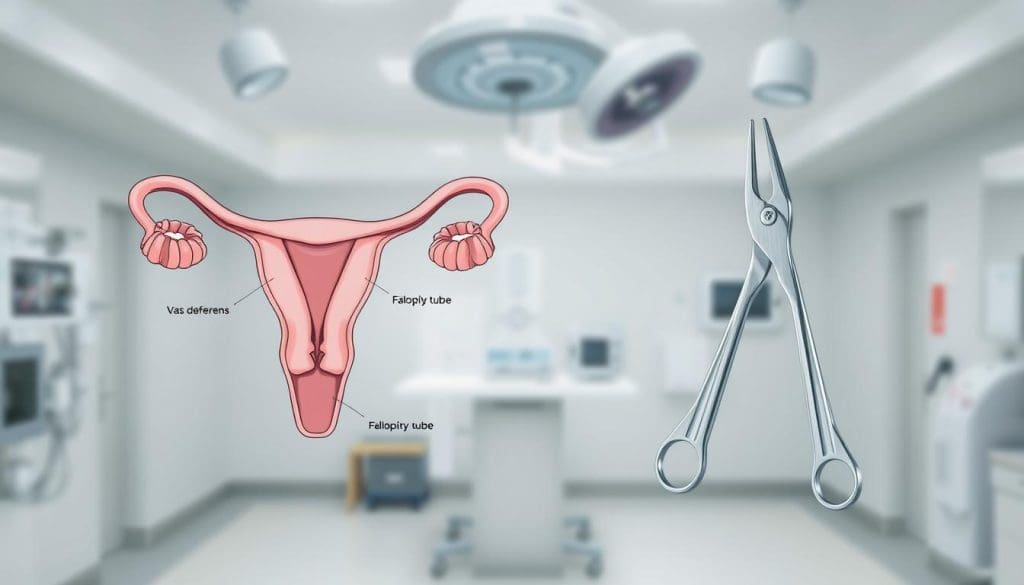
Choosing sterilization is a big decision. It means not having children anymore. Sterilization surgery, such as tubal ligation for women and vasectomy for men, is a permanent way to stop having kids. At livhospital.com, we help people make informed choices about their reproductive health.
These surgeries can’t be undone, so it’s important to understand them fully. Women may undergo a procedure that seals the fallopian tubes, while men might choose a vasectomy to stop sperm from reaching the egg. For more info, check out UF Health.
Key Takeaways
- Permanent contraception is achieved through sterilization surgery.
- Options include female sterilization and vasectomy.
- These surgeries are generally irreversible, stressing the need for careful thought.
- Understanding the procedures and their effects is essential for reproductive health.
Female Sterilization
Women looking for a permanent birth control option might consider surgery that blocks the fallopian tubes. This operation is done under general anesthesia and is highly effective.
Choosing the right reproductive health option can be tough. Female sterilization has a small failure rate (3“5%) and is a strong choice for those certain about not wanting more kids.
How It Works
The procedure stops eggs from being fertilized. It can be done laparoscopically or during a C-section. There are a few methods:
- Cutting and tying the tubes with a special thread
- Closing them with bands or clips
- Sealing them using an electric current
The method depends on the patient’s health and the surgeon’s recommendation. Our team provides personalized guidance and care to help you select the best option.
The surgery is performed under general anesthesia to minimize pain. While safe, it’s important to weigh the risks and benefits carefully. We support patients in making informed, confident decisions.ile it’s safe, it’s good to know the risks and benefits. We help you make informed choices and offer personalized care for the best results.

Effectiveness and Risks of Tubal Ligation
Choosing to have a tubal ligation means knowing its good and bad sides. This surgery, also called female sterilization, works well as birth control. But it comes with some risks.
Tubal ligation is meant to last forever. Yet, it’s not perfect. About 3“5% of the time, it fails, leading to unplanned pregnancies. Remember, no birth control is 100% safe, and tubal ligation is no different.

Another big worry is tubal ligation reversal if you want more kids later. But, reversing it doesn’t always work. So, think carefully before choosing tubal ligation as your permanent birth control.
There are other risks, too. These include surgery problems, ectopic pregnancy if it fails, and long-term side effects. Tubal ligation doesn’t harm your egg quality or hormone balance. So, “Can eggs go bad?” isn’t a worry with this procedure.
At our place, we make sure you know what’s up. Our team gives you all the facts and support you need. We’re here to help you understand the risks of tubal ligation and how well it works.
Effectiveness and Risks of Vasectomy
Understanding vasectomy’s effectiveness and risks is key for men thinking about it. Vasectomy is a top choice for male sterilization, with a success rate of up to 99% effectiveness. It works by cutting and sealing the vas deferens, stopping sperm from reaching the semen.
At our institution, we stress the importance of making informed choices about reproductive health. Vasectomy is done under local anesthesia, making it safe and simple. But, like any surgery, it can have risks like infection, sperm cramp, or failure.

VVasectomy’s benefits include its high success rate and the fact that it does not affect hormones or sex life. It also offers detailed insights into different contraceptive methods.
Some important things to know about vasectomy include:
- The procedure is quick and performed under local anesthesia.
- It carries a low risk of complications when done by skilled healthcare professionals.
- Following post-procedure instructions is key to avoiding risks.
Remember, vasectomy is permanent, and reversal success is not guaranteed.
We support men in making informed choices about reproductive health. If you’re considering permanent birth control, talk to a healthcare provider. They can help you decide what’s best for you.
Comparing Tubal Ligation and Vasectomy
When looking into permanent birth control, many people compare tubal ligation with vasectomy. Both methods have seen a significant rise in use, with a 70% increase in tubal sterilizations and a 95% increase in vasectomies among younger adults.
Rising Demand for Sterilization Procedures
More people are choosing sterilization for family planning, partly due to legal and cultural changes. Today, tubal ligation and vasectomy are widely accepted as reliable permanent options.
Key Considerations
At livhospital.com, we aim to make healthcare accessible and complete. When weighing tubal ligation and vasectomy, think about their effectiveness, potential risks, and personal preferences. For those seeking options, including the possibility of tubal ligation reversal, we provide guidance and support in reproductive health decisions.
FAQ
What is tubal ligation?
Tubal ligation is a surgery that blocks the fallopian tubes. It stops eggs from being fertilized. It’s a permanent way for women to prevent pregnancy.
How effective is tubal ligation?
It’s very effective, but there’s a small chance it might not work. This could lead to an unplanned pregnancy.
Can tubal ligation be reversed?
It’s seen as a permanent choice. Reversing it is not always possible or successful.
What is a vasectomy?
A vasectomy is a surgical procedure for men. It cuts and seals the vas deferens. This stops sperm from mixing with semen, making it a permanent birth control method.
How effective is a vasectomy?
Vasectomy is very effective, with a success rate of up to 99%. It’s a reliable choice for those who don’t want more children.
What are the risks associated with tubal ligation and vasectomy?
Both have risks and complications. Our healthcare team will talk to you about these to make sure you know what to expect.
What is the difference between tubal ligation and tubal sterilization?
Tubal ligation and tubal sterilization are the same. They both block or sever the fallopian tubes to prevent pregnancy.
How is tubal ligation performed?
Tubal ligation can be done in different ways. These include laparoscopic surgery, mini-laparotomy, and laparotomy. Each method has its own benefits and risks.
What is the recovery process like after a vasectomy?
Our team will guide you through the recovery after a vasectomy. This includes post-operative care and follow-up appointments.
Can eggs be fertilized after a tubal ligation?
Tubal ligation is meant to prevent fertilization. But there’s a small chance it might not work. This could lead to an unplanned pregnancy.
Is sterilization reversible?
Sterilization, like tubal ligation and vasectomy, is usually permanent. Reversing it is not always possible or successful.
What are the alternatives to tubal ligation and vasectomy?
Our healthcare team can talk to you about other birth control options. These include non-surgical methods and other forms of contraception.
References
- National Center for Health Statistics. (2021). Contraceptive Use in the United States, 2017“2019. Vital and Health Statistics, Series 23, No. 43. https://www.cdc.gov/nchs/data/series/sr23/sr23-043-508.pdf


































